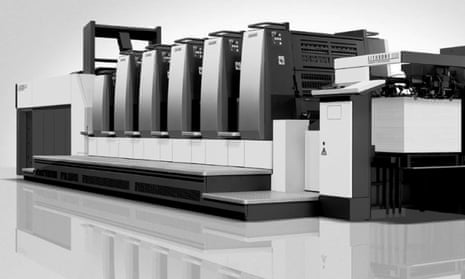Since Johann Gutenberg the printing press has been associated with human enlightenment, but that was before the Irish parliament decided to order a giant printer.
A series of debacles over a €808,000 state-of-the-art Komori printer has this week left officials red-faced, triggered an inquiry and prompted jokes about monster ink.
After the machine, measuring 2.1 metres high by 1.9 metres wide, arrived in Ireland last December officials at the legislature, the Oireachtas, discovered it did not fit into the building.
They could not return it to the UK manufacturer because the contract had already been signed. So they moved it to an industrial estate until September, paying storage fees, while builders tore down walls and embedded structural steel to create more height clearance at Kildare House, racking up €236,000 in additional costs.
The printer is now installed but idle because of an industrial relations dispute. According to the Irish Times, Oireachtas staff refuse to operate it, saying they need training and a pay rise, and in any case IT colleagues are reluctant to grant it server permissions, meaning it cannot run.
The fiasco has led to a public and political outcry and calls for more transparency in the legislature.
RTÉ reported on Tuesday that Peter Finnegan, the clerk of the Dáil, the lower house, would hold a “fast-track inquiry” and brief the chamber’s public accounts committee by the end of the week.
“The report will deal with the full costs associated with the procurement together with any other relevant issues,” Finnegan wrote in a letter to the committee.
David Cullinane, a Sinn Féin TD, said he and other members of the committee would ask why they were not enlightened earlier about the cost overruns. “It is all too common for a lack of planning and foresight on behalf of government departments to result in additional costs for the taxpayer.”
Critics say the Irish state has a chronic inability to deliver projects on time and within budget. Costs for a new children’s hospital in Dublin are predicted to rise past €2bn, up from an estimated €800m in 2014. The government last week introduced a €3bn rural broadband plan that in 2014 was expected to cost €500m.
